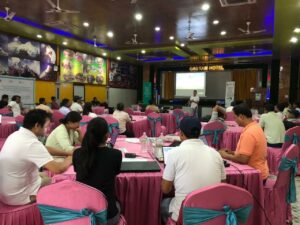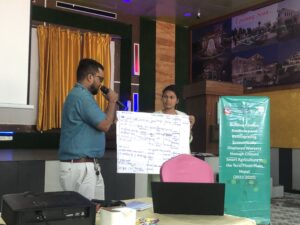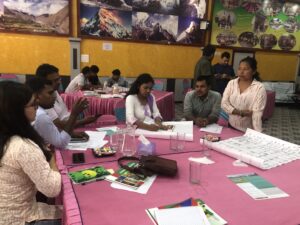26-28 July 2023, Bardibas, Nepal – In Nepal’s lowland flood plains, known as the Terai, the food basket of Nepal, the agriculture sector plays a crucial role in the country’s economy, providing livelihoods for many communities. However, this vital sector faces significant challenges due to climate-driven emergencies such as floods and droughts, which regularly damage crops and undermine food, income, and job security for people living there.
To address these challenges and foster climate resilience in agriculture, GGGI has been implementing the Climate Smart Agriculture (CSA) project in the Terai flood plains of Nepal with financial support from the Korea International Cooperation Agency (KOICA). The CSA project aims to support the widespread adoption of climate smart agriculture practices such as drip irrigation, mulching, solar irrigation, drought-tolerant varieties, etc for cereal and vegetable production. Furthermore, the project aims to reduce vulnerability and improve food and job security, with a special focus on women, youth and returnee migrant workers in the project area.
To support this, GGGI concluded a three-day capacity-building training to empower municipal officials with the necessary knowledge in climate-smart agriculture. The training sessions were facilitated by experts from Nepal Agricultural Research Council (NARC), Agriculture Knowledge Center (AKC) and GGGI who provided in-depth knowledge of CSA technologies and practices. The primary focus of the workshop was to strengthen the knowledge of municipal officials about climate-smart agricultural tools and technologies and further engage them in drafting Climate-Smart Agriculture (CSA) plans tailored to their respective municipalities. The training was equally helpful in building rapport among local and provincial-level officials.
“Strengthening local government is key to empowering farmers, as they are the closest institution to the agricultural community. We take immense pride in this CSA project and its ground-level approach, working hand in hand with local governments to bring about positive change and support sustainable development for farmers,” said Dr. Bisheswar Prasad Yadav, Senior Scientist, NARC.
The planning officer from Bhangaha municipality also expressed his views on the importance of building knowledge on CSA. “This workshop brilliantly showed us how to effectively integrate climate smart agriculture strategies into our agriculture plan which would otherwise have been a simple generic plan. We are grateful towards GGGI.” Similarly, Ms. Pratibha Pandey, the Agriculture Officer, welcomed the training materials, stating, “The practical and relevant content provided in this workshop is something we are eager to put into action within our municipality.”
“As male community members migrate for jobs abroad, women’s participation in agriculture is on the rise. Hence, GGGI is planning to focus on tools and equipment which are women friendly and will be easire for them to use,” shared Mr. Rakesh Kumar Sha, Senior Disaster Risk Management and Agriculture Associate, GGGI.
The three-day workshop not only equipped officials with CSA knowledge but also fostered collaboration and planning, setting the stage for effective climate-smart initiatives at the community level. During the workshop, participants identified CSA activities and developed a first draft of CSA plan for their respective municipality. Subsequently, GGGI staff members will provide continued support by following up on the draft plan, which will serve as the foundation for developing and implementing CSA plans in ten project municipalities under the CSA project.


